Veteran of four wars, four enlistments, four branches: Air Force, Army, Army Reserve, Army National Guard. I am both an AF (Air Force) veteran and as Veteran AF (As Fuck)
Monday, May 9, 2022
Victory Day, May 9, Is Also the Day I Broke 13 of 40 Bones
Friday, April 8, 2022
The Joy of Work: Packing Supplies for Ukraine
Monday, March 7, 2022
Prisoners of Geography, Published in 2015, Relevant Right Now! Book 11 of 2022
Sometimes a book title promises a lot more than it can deliver. The 16-word title, Prisoners of Geography: Ten Maps That Tell You Everything You Need to Know About Global Politics by Tim Marshall is too modest by half. Published in 2015, this book explains the Good, the Bad and the Ugly in global politics right now.
The author, Tim Marshall, a former war correspondent for Sky News, lives in London and continues the book on his website and Facebook Page, The What and the Why.
The ten chapters are ten maps of ten regions followed by 20-30 pages of history and current geopolitics. The first chapter is "Russia." The first line of the introduction is about the current President and wannabe Tsar of Russia:
"Vladimir Putin says he is a religious man, a great supporter of the Russian Orthodox church. If so, he may well go to bed each night, say his prayers, and ask God: 'Why didn't you put some mountains in Ukraine?'
(Using this same quote, I recently wrote about bad religion that kills good people. Putin is now the Poster Boy of this sort of murder, but all the priests pandering to him will certainly share his circle of Hell.)
In the next paragraph Marshall says "As it is, Putin has no choice: he must at least attempt to control the flat lands to the west." In the first chapter on Russia, Marshall explains the geography and history that will compel the Russian leader to get control of Ukraine. As I write this, Putin is in the midst of a massive invasion of Ukraine with the object of taking over the free country of 44 million people. Marshall says Moldova is also on Putin's must-conquer list, where he will use the excuse of the Russian-speaking area of Transnistria to trigger that invasion.
When I read this chapter two weeks ago, the invasion had not yet begun, but 150,000 Russian troops surrounded the country of Ukraine to the north and east on the ground and to the south on the Black Sea and in the recently seized territory of Crimea. Marshall explains the thousand-year history of Russia that led the world to the current conflict as well as the recent history. Putin was President during the second war in Chechnya almost twenty years ago. He reduced the Chechen capital Grozny to rubble with thermobaric bombs. They are already rumored to be in use in Ukraine.
After prescient predictions about Russia, chapter two is "China." Again, current crimes have a geopolitical imperative. Marshall explains why the oppression of the Uighurs in northeastern China will not end until China is fully in control. The land where the Uighurs live is critical to China's control of agriculture within the country and its domination of Tibet and Mongolia. The good news is that China has enough to do within its current borders that subjugating Taiwan is not the top of Xi's geopolitical hit list.
The next chapter is the "United States." After the ominous first two chapters, this one is a geographic celebration. No question that the best place to be born and to live in the 20th and 21st Centuries is the United States. The Russia and China chapters and every other chapter is, in part, about complex borders and tensions between bordering countries. The United States has long, peaceful borders to the north and south and vast oceans to the east and west. The US economy is still the strongest in the world, the climate is varied, the both coasts have lots of good harbors, and the Mississippi River is the most navigable inland waterway on the planet.
Reading the United States chapter reminded me that the book was written before Trump and COVID-19. Despite the plague and pandemic they brought, the United States still has the strongest economy in the world and Russia's invasion of Ukraine is even giving the US a glimmer of national unity.
"Western Europe" is the fourth chapter. Marshall explains the geopolitical history that kept Europe in conflict every generation from the Roman Empire until 1945. The unprecedented 77 years without a land war that followed ended with the Russia's invasion of Ukraine. But the unity in Europe that followed is a bright ray of hope. NATO and the European Union really are united in opposing Putin. Even to the point that Germany is re-arming and Sweden, Switzerland and Finland are ending their neutrality.
"Africa" is the next chapter. The enormous continent of 54 countries and two billion people has few navigable rivers and is divided by deserts, mountains and jungles. And then there are all the conflicts stemming from badly drawn colonial borders and murderous colonial policies. Geography imprisons many inhabitants of Africa in difficult circumstances.
Swinging north and east of Africa, Marshall's next chapter is the "Middle East." If religion is part of every regional conflict, it is central to the mess that is the Middle East. As with Africa, badly drawn borders inflame smoldering conflicts. The Jewish state of Israel is surrounded by a dozen countries with combined populations twenty times that of Israel where children in school are taught to hate and kill Jews.
The arid geography of most of the Middle East means there would be conflicts over water and arable land even if the states were not openly hostile. The region was and is the site of several recent and current wars. Geography made Iraq easy to invade, and it makes Afghanistan impossible to conquer. The American withdrawal last year follows the Russian defeat in 1989 and British defeats in the 1840s and 1880s. Geography keeps Iran isolated and relatively safe from attack and make Lebanon a terrorist playground.
"India and Pakistan" are locked in permanent conflict that limits the ability of both countries to grow and prosper. While geography keeps India safely separate from invasion by China, the border with Pakistan is the scene of endless disputes. Marshall describes the complexity of Pakistan's relationship with neighboring Afghanistan and why it is mired in America's war with the Taliban. At the writing of the book, NATO had left Afghanistan and America had a small force there. A new phase of the border war began in August with America's withdrawal from Afghanistan.
"Korea and Japan" are a chapter to themselves. As with India and Pakistan, the two countries have a centuries long history of conflict. Some of the worst of that conflict was the Japanese occupation of Korea during World War II. Sadly, that was followed by the Korean War in 1950. Japan emerged from the war as a leading world economy and a unified nation. Korea is divided into the prosperous south and the most oppressive dictatorship in the world in the north. The border area is among the most tense in the world.
The ninth chapter is Latin America, from the Rio Grande Valley to Tierra del Fuego. So many aspects of geography put Latin America at a great disadvantage compared to North America. There is bonanza of harbors in the north compared with cliffs and straight, narrow coastal areas. Africa has the same plight, thousands of miles of coast useless for shipping. Aside from the Rio del Plata, the rivers are not navigable. The Andes are the longest mountain chain and a barrier to all trade between the Pacific Coast and the rest of the continent.
The final chapter is the "Arctic." It is a full circle back to Russia. Whether he discusses trade routes, oil and gas drilling, mining, or relations among the countries bordering the arctic region, Russia is acting in bad faith and cheating on agreements. As the polar ice diminishes, countries around the region will have more opportunities for trade and business, and more points of conflict with Russia.
The Conclusion is much sunnier than the book itself. Marshall sees reasons for hope. Possibly because the book was written before the first land war in Europe in 77 years, or the plagues of Trump and COVID. In any case, the book is a fascinating look at our world as it was, is, and will be. The real world written in the reality of land, sea and air.
First ten books of 2022:
Understanding Beliefs by Nils Nilsson
1776 by David McCullough
The Life of the Mind by Hannah Arendt
Civilization: The West and the Rest by Niall Ferguson
How to Fight Anti-Semitism by Bari Weiss
Unflattening by Nick Sousanis
Marie Curie by Agnieszka Biskup (en francais)
The Next Civil War by Stephen Marche
Fritz Haber, Volume 1 by David Vandermeulen
Tuesday, August 23, 2016
My Love-Hate Relationship with Russia and Ukraine
The Old Man and the Sea by Ernest Hemingway
I grew up near the sea, several miles from the Atlantic Ocean north of Boston. While the sea was always near, it was also remote for me. Ou...

-
Tasks, Conditions and Standards is how we learn to do everything in the Army. If you are assigned to be the machine gunner in a rifle squad...
-
On 10 November 2003 the crew of Chinook helicopter Yankee 2-6 made this landing on a cliff in Afghanistan. Artist Larry Selman i...
-
Senatus Populusque Romanus The Senate and People of Rome Some of the soldiers I served with in Iraq talked about getting an SPQR tat...









